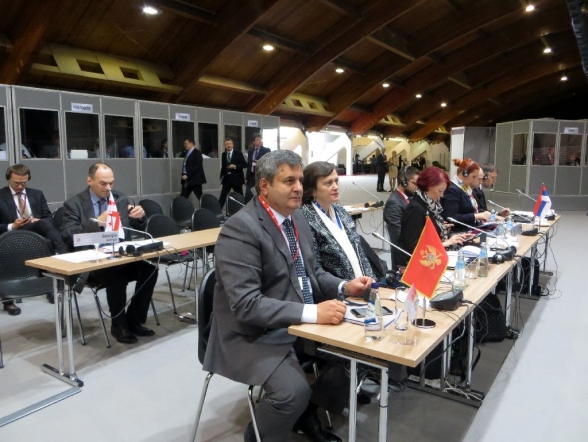Second day of the plenary meeting of COSAC that was held in Riga, was marked by the discussion on the future of parliamentary scrutiny of the European Union Affairs, and on the possibilities for strengthening the role of national parliaments.
During the session on the role of national parliaments in decision-making within the EU, the introductory speakers were Mr Herman De Croo, the member of the Parliament of Flanders and Mr Gunther Krichbaum, the Chairman of the Committee on Affairs of the European Union of the German Bundestag. It was emphasized that the process of association and cooperation among European countries has been supported since the beginning by strong political and ideological motivation for the preservation and strengthening of peace, prosperity and freedom. In this regard, the creation of the European Parliament, followed by the introduction of the system of direct elections, is a key step for strengthening of democratic legitimacy of the European project. However, the commitment to creation of a united Europe and a historical progress in establishing free movement of goods, persons, services and capital, have led to a questioning of the role of national parliaments in this process. Within the session, there were opinions that with the adoption of the Lisbon Treaty and the strengthening of transparency in the work of European institutions the progress was made, but that there was also a room for improvement. Parliamentarians particularly stressed the importance of strengthening parliamentary oversight of the honoring of the principle of proportionality. In addition, Ms Agnieszka Pomaska, the Chairwoman of the European Union Affairs Committee of the Polish Sejm, presented the results of the working group on the improvement of procedures for the so called "yellow cards", whose members proposed extension of the deadline for the national parliaments to submit reasoned opinions on the possible violation of the principle of subsidiarity by the EC.
During the second session on the topic of establishing a "green card", the speeches were delivered by Mr Dominic Hannigan, the Chairman of the Joint Committee on European Union Affairs of the Parliament of Ireland and Mr Paolo Tancredi, the Deputy Chairman of the Committee on European Union Policies of the Italian Chamber of Deputies. The proposed mechanism should enable a proactive approach of national parliaments, namely the right to submit non-binding legislative proposals, without encroaching upon the right of the EC to initiate legislation. During the discussion, opinion on the importance of this initiative for strengthening the role of national parliaments could be heard, but also doubts on whether this mechanism was in accordance with current agreements.
On the subject of the European Commission’s multiannual work programme and the role of national parliaments, speeches were delivered by Ms Maria João Rodrigues, member of the Committee on Employment and Social Affairs of the European Parliament and Ms Danielle Auroi, the Chairwoman of the Committee on European Affairs of the French National Assembly. After presenting the European Commission’s multiannual work programme, parliamentarians discussed possibilities for interaction between the European Parliament and national parliaments in its drafting. During the discussion it was pointed out that the role of parliaments was extremely important, not only because closer communication with European citizens was exercised, but also because they provided for the democratic legitimacy to the development of the European Union.
At the end of the Plenary meeting of the COSAC, conclusions were adopted: welcoming the initiative for the establishment of the Energy Union; calling on the Luxembourg as the following presidency to establish a working group for defining the mechanism of the "green card" and improvement of the system of the "yellow card", welcoming the ongoing trade negotiations with the United States, but also pointing out that the EU implemented high standards of health and food safety, consumer protection and other areas; and calling for a comprehensive and permanent humanitarian rescue operation, such as Mare Nostrum, on the high seas, which would be contribute by the Member States. Also, at the end of the Plenary meeting, the Joint Statement of COSAC on recent entry bans imposed by the Russian Federation, was adopted.
The meeting was attended by the delegation of the Parliament of Montenegro, composed of the Chairman of the Committee on European Integration, Mr Slaven Radunović and the member of the Committee, Ms Nada Drobnjak.









